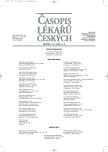Promise of Immunotherapy of the Chronic Myeloid Leukaemia
Možnosti imunoterapie chronické myeloidní leukémie
Vzhledem k přítomnosti jedinečných antigenů v nádorových buňkách představuje chronická myeloidní leukémie atraktivní cíl pro imunoterapii. Pokroky v oblastech genové terapie, nádorové imunologie a vakcinologie nabízejí celé spektrum preparátů, které by mohly být využity pro tento účel. Dosud omezené zkušenosti získané na pacientech s chronickou myeloidní leukémií demonstrují, že je možné vyvolat specifické imunitní reakce pomocí syntetických peptidových vakcín. Jejich klinická účinnost je však prozatím malá. Probíhající studie na myších modelech by měly ukázat, jak vyvolat účinnou imunitu proti buňkám transformovaným fúzním genem bcr-abl. Autor diskutuje výhody ale i omezení zvířecích modelů pro vývoj prostředků imunoterapie chronické myeloidní leukémie. Zabývá se i možností, že vakcíny založené na imunogenech odvozených od proteinu bcr-abl a prokazatelně účinné v myších modelech nebudou mít žádoucí léčebný efekt u pacientů s chronickou myeloidní leukémií, a navrhuje, jak se s možnými problémy vyrovnat.
Klíčová slova:
chronická myeloidní leukémie, imunologie, vakcíny.
Authors:
V. Vonka
Authors‘ workplace:
Ústav hematologie a krevní transfuze, Praha
Published in:
Čas. Lék. čes. 2005; 144: 172-176
Category:
Review Article
Overview
Because of the presence of unique antigens, chronic myeloid leukaemia (CML) represents an appealing target for immunotherapy. The progress achieved in the fields of gene therapy, tumour immunology and vaccinology offers a wide spectrum of methods that could be utilized for the development of therapeutic vaccines against CML. Experience obtained in several clinical studies with peptide-based vaccines have made it clear that it is possible to induce specific immune reactivity; however, its clinical efficacy has been low if any. Studies in mouse systems, which are under way, should be helpful in defining the optimal strategy for immunizing human subjects against bcr-abl positive cells. The author adduces some advantages, but also the limitations, of animal models for this purpose. He also comments on the possibility that the bcr-abl-based therapeutic vaccines might be found ineffective and proposes procedures how to deal with the problem.
Key words:
chronic myelogenous leukaemia, immunology, vaccines.
Labels
Addictology Allergology and clinical immunology Angiology Audiology Clinical biochemistry Dermatology & STDs Paediatric gastroenterology Paediatric surgery Paediatric cardiology Paediatric neurology Paediatric ENT Paediatric psychiatry Paediatric rheumatology Diabetology Pharmacy Vascular surgery Pain management Dental HygienistArticle was published in
Journal of Czech Physicians

- Possibilities of Using Metamizole in the Treatment of Acute Primary Headaches
- Metamizole at a Glance and in Practice – Effective Non-Opioid Analgesic for All Ages
- Advances in the Treatment of Myasthenia Gravis on the Horizon
- Metamizole vs. Tramadol in Postoperative Analgesia
- Spasmolytic Effect of Metamizole
-
All articles in this issue
- Contemporary Prospects of Prevention of Type 2 Diabetes Mellitus
- Conservative Therapy of Female Urinary Incontinence – Potential and Effect
- Contemporary Potential of the Mini-invasive Surgical Treatment of the Female Stress Urinary Incontinence
- Contemporary View on the Plasma Natriuretic Peptide Assessment in the Clinical Practice
- Possibilities of the Laboratory Diagnostic of Metabolic Skeletal Changes
- Foetal ECG in the Prediction of Intrapartum Hypoxia
- Promise of Immunotherapy of the Chronic Myeloid Leukaemia
- Endoscopic Investigations in Children under 3 Years of Age at the Clinic of Paediatric Surgery
- Myocardial Ischaemia Resulting from Compression of Coronary Artery Caused by Herniation of Abdominal Organs into Thoracic Cavity
- Shaken Baby Syndrome
- Psychosomatics is „Expensive“
- Patients Treated for Addictive Diseases in the Psychiatric Centre Bohnice in Years 1994 to 2003
- Language and Style of Texts in the Journal of Czech Physicians
- Journal of Czech Physicians
- Journal archive
- Current issue
- About the journal
Most read in this issue
- Foetal ECG in the Prediction of Intrapartum Hypoxia
- Psychosomatics is „Expensive“
- Conservative Therapy of Female Urinary Incontinence – Potential and Effect
- Promise of Immunotherapy of the Chronic Myeloid Leukaemia
